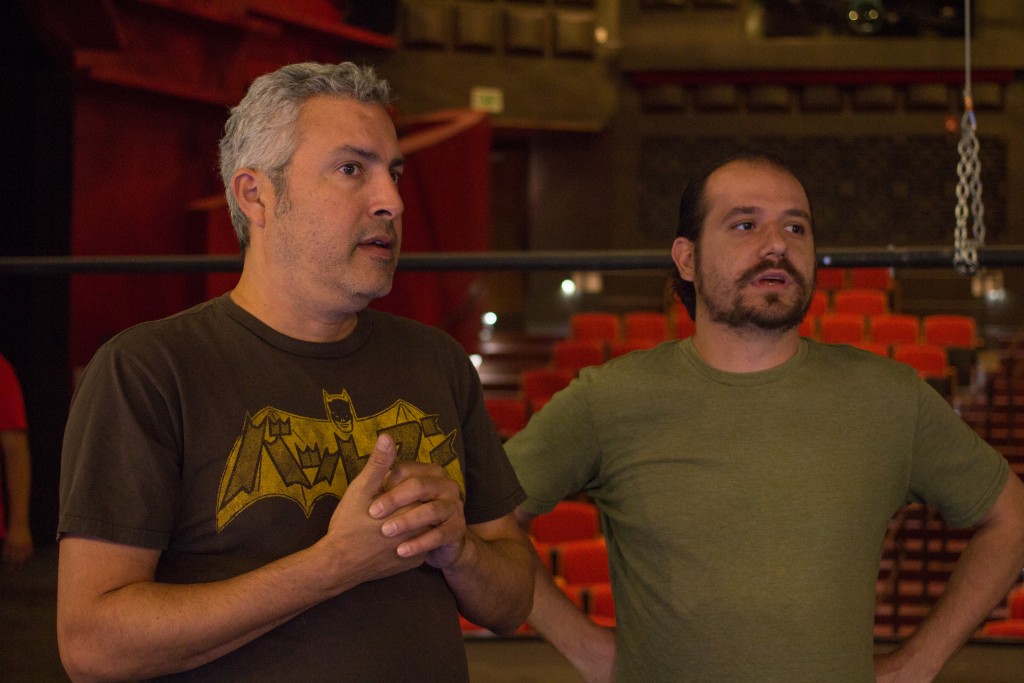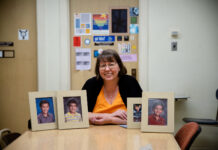
A man stands with a group of students, informing them safety precautions about using a table saw in the workshop. His salt and pepper hair reflects some of the light overhead. His off-white facial hair scatter across his face, down to the underside of his chin as he speaks about what the table saw can do when it comes to making interesting cuts and shapes. He stands up right, broad shoulders, a man that can keep a good shape to his body. His slight smile is seen as he continues talking to the students in the workshop inside of Pierce College’s Performing Arts Building. Edward Salas, a theater instructor here at Pierce, is excited to be teaching in the workshop.
“I’ve been [at Pierce] almost 15 years. It has been a long time but it doesn’t feel like it. The job constantly evolves as does the technology.”
That job is theater technician. A theater technician maintains a theater and the theater’s equipment that includes: sound equipment like microphones, speakers, sound effects; lighting equipment; and set design. Salas also assists the instructors that are teaching technical theatre to the students at Pierce. “Each show has its unique set problems that keep the work fresh,” Salas says.
Before coming to work at Pierce, Salas worked all over Los Angeles, mainly in “99 seat theatres” in Hollywood as a lighting designer, set designer, along with being a sound designer for hundreds of theatre and dance productions. The “Los Angeles 99-seat theatre plan” was introduced by the Actors’ Equity Association that allows “[99-seat theaters] utilize the work and talent of Equity members without wage compensation,” taken from the Actor’s Equity Association’s Los Angeles 99-Seat Theatre Plan at www.actorsequity.org.
“There is a lot of theatre in LA,” says Salas, “I was always a part of it.”
Salas joined Pierce College when Matt Chair, owner of The Complex in Hollywood, told him about an offering to be a theater technician, Salas took it. “I took the job for the security,” Salas said.
Gene Putnam was department chair of the theatre and dance when Salas joined.
“That was quite an adventure.” After Putnam retired, Valorie Greer became the next chairman for the department for a few years and now Michael Gend is the current chairman. “Michael Gend was a student when I started,” Salas says. “…Just shows what a good education can bring.”
Salas takes pleasure when working with students, to share the many challenges on theatre for any upcoming production in Pierce College especially the department’s
class. Salas comments about the class, “[The] class really enjoys putting the set together and working on the productions.” He continues, “They get really invested in the production they work on, from imagination to the stage.”
Many directors have brought productions to the stage and Salas was always a part of it. He takes his work with pride, knowing that through the troubles and conflicts of each single production, he will find a way to solve the problems with the directors. “…with each production, we get a new set of problems,” Salas adds, “Each director we work with has vastly different styles, perspectives, and methods of working.”
Salas has worked in many known, quality productions but his favourite would be the production West Side Story. Salas was the lighting designer and also participated in the acting aspect as Lieutenant Schrank, a racist police officer in the production. “[It] was an interesting dynamic in the scene and behind the scene at once,” Salas remembers.
“I work with a really great team!” Salas exclaims about working with the staff and students in Pierce. “The love of theatre is infectious. Many of them continue their education in theatre, then go to work in theatre” Salas smiles at the fact. “Also, becoming involved in the empowerment of theatre student can be pretty exciting.”


